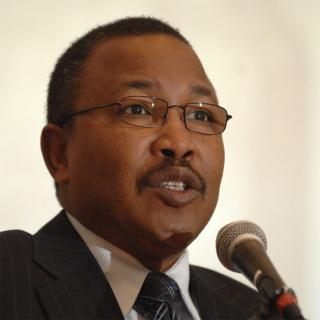Genocide in Darfur: A Call to Action

Omer Ismail
General Assembly 2007 Event 3052
On Friday afternoon, two hundred members of the General Assembly (GA) met to hear Dr. Omer Ismail chronicle some of the complex historical, political and cultural factors which contributed to the painful realities now confronting Darfur. Dr. Ismail has spent twenty years actively intervening in humanitarian conflicts on the horn of Africa, in a lifetime devoted to human rights activism. He is currently a Fellow at the Carr Human Rights Center at Harvard University. Martha Thompson, Program Manager for Rights in Humanitarian Crisis at the Unitarian Universalist Service Committee (UUSC) prefaced her introduction of Dr. Ismail by reminding the audience that UUSC founders, who risked their lives to help rescue those threatened by Nazi genocides in the last century, are an inspiration for the current Drumbeat for Darfur campaign of the Service Committee. Our generation continues the legacy of the Sharps by addressing the crisis of these times, including the genocide in Darfur.
Dr. Ismail began his talk with a wish that everyone in the room could more deeply and empathetically understand the contributing factors to the crisis in Sudan and from that understanding be empowered to take action. He spoke at length about the complexity of the situation in Darfur. Using maps, he orientated the group to the geopolitical contours of Sudan, and the four distinctive regional identities of the inhabitants of the country. Today in Sudan, depending on the definitions applied, there are between 370 to five hundred distinct ethnic groups. There are between 250 to four hundred dialects, and Muslim, Christian and African religious identities. The appellation, Sudan, he explained, was a descriptive name, “the Sudan” meaning “the place where the black people live.” Today, Sudan is bordered by nine other countries, or as Dr. Ismail put it, “Sudan is a big place in a tough neighborhood.”
He described the colonization waves that have swamped Sudan during the past two centuries, from the Turkish imperialism of the early nineteenth century, to the independence movements of Charles Gordon, and re-colonization by the British and Egyptians in the early nineteenth century. Dr. Ismail acknowledged that after Sudan regained independence in 1956, the Sudanization of the government replaced colonial officials who were loyal to Britain or Egypt with local leaders who were loyal to their particular ethnic or religious group. Additionally, the maps drawn by the colonialists imposed arbitrary geopolitical boundaries, not tribal, ethnic or religious ones. The inequities that arose in the aftermath contributed greatly to the current crisis, as Darfurians were under represented in official decision making roles. Only two posts were awarded to Darfurians out of an available eight hundred thirty six.
Dr. Ismail described the current situation in Sudan and Darfur, and expressed concern for the domino effect of destabilization that is becoming apparent as the Darfur crisis remains unchecked. In closing he asked those present to remember that we are all citizens of the world and that Darfur parallels other places and other times in our history. If this genocide is allowed to go unchecked and unacknowledged by the nations of the world, as were those of Serbia, there will be other genocides in the future.
Charlie Clements of the Unitarian Universalist Service Committee spoke briefly to remind the audience that they could take very specific actions to address the crisis and encouraged them to take any or all of these steps. Join the Service Committee (UUSC), participate in a mobilization list for Drum Beat for Darfur, sign and send a letter to the Olympic Committee applying pressure to China, a country which participates in maintaining the status quo in Sudan. He invited the group to participate in a local (Portland, Oregon) public witness event on Sunday June 24th, at 11:30 a.m.
As Dr. Ismail said, “For evil to triumph, it only takes one person like me or you to stand on the sidelines.”
Reported by Rebecca Kelly-Morgan; edited by Pat Emery.